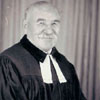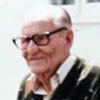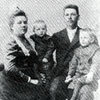Anecdotes by Jack Kulpas
The son of Mina and Anton Kulpas and Grandson of Jacob Erdman.
 Jack Kulpas, in 1970, gave an account of Lutheran Reverend Sillak from Medicine Hat. Apparently the reverend could speak a number of languages. He often came to the Erdman's farm in Barons to give a sermon to the Estonians in the area. On one occasion he gave the Estonian sermon at 11 a.m. and the German sermon immediately afterward. An English neighbour sat through both sermons and upon being asked why she did so when she knew neither language, she said she liked to hear the Estonians sing hymns.
Jack Kulpas, in 1970, gave an account of Lutheran Reverend Sillak from Medicine Hat. Apparently the reverend could speak a number of languages. He often came to the Erdman's farm in Barons to give a sermon to the Estonians in the area. On one occasion he gave the Estonian sermon at 11 a.m. and the German sermon immediately afterward. An English neighbour sat through both sermons and upon being asked why she did so when she knew neither language, she said she liked to hear the Estonians sing hymns.
The gift of music seems to be part of the Estonian heritage. The neighbour didn't miss much in the sermon, because the reverend preached according to his habit, repeating one verse from the Bible, over and over again, each time louder than the time before, until he was thumping the pulpit and shouting the message.
After church, the men met and talked outside while the women sat inside and drank tea. The children were sent out to play. Rev. Sillak seems to have featured prominently in the lives of the pioneer Estonians of southern Alberta, being called for marriages, and funerals, and giving advice to new comers.
Miina (Erdman) Kulpas's son, Jack Kulpas was born in 1901 in Pierre, South Dakota. Jack Kulpas has written many amusing pioneer anecdotes beginning on page 312 in "Juri's Children" compiled by Barbara Gullickson of Barons.
 Jack mentions the Krikentals who lived just west of the Kulpas farm. The boy August was a playmate of Jack's. There were two sisters in that family. The Lensmans lived nearby. There were three girls in that family. If the children got into trouble, grandma Mari Erdman, would sit them down in a row, leave them silently in thought while she fetched her Bible. Then she would sit in front of them and thumb through the Bible, whilst the children became more and more fearful. Finally she would quote passages from the Bible, threatening "brimstone and fire". This was followed by two words from the children -"I'm sorry." Afterward, she fed them cakes and doughnuts and forgot about the whole incident.
Jack mentions the Krikentals who lived just west of the Kulpas farm. The boy August was a playmate of Jack's. There were two sisters in that family. The Lensmans lived nearby. There were three girls in that family. If the children got into trouble, grandma Mari Erdman, would sit them down in a row, leave them silently in thought while she fetched her Bible. Then she would sit in front of them and thumb through the Bible, whilst the children became more and more fearful. Finally she would quote passages from the Bible, threatening "brimstone and fire". This was followed by two words from the children -"I'm sorry." Afterward, she fed them cakes and doughnuts and forgot about the whole incident.
Robert Erdman taught Jack how to make snares to catch gophers. However, one day August Krikental and Jack chased a skunk, got sprayed, and had to sleep in the haystack for a week until the smell went away.
At first Jack and some of the neighbours' children were schooled in Estonian at home by Jack's mother and father. The Bible was the only book they had. Some English and arithmetic was added. After two years, the Wheatland Center school was opened up and the children walked there, knowing very little English.
Jack remembers how things gradually "modernized". Kerosene lamps replaced home- made candles. Stoves burned wood and coal, rather than buffalo "chips" and straw. The new washboard had a little ledge on it where his mother could place the bar of soap!
One weekend, ten men from neighbouring farms came to the Kulpas farm to fence in about 10 acres and build a hen house. The women cooked up a big supper and with some beer to help out, and a good time was had by all.
 Jack's father Anton (born 1877 in Crimea, died 1960 in San Diego); he was a community "water witcher". He used a forked willow stick. He would walk around and when the end of the stick dipped towards the earth, the men would start digging, for perhaps three days. He was usually successful in finding the location, and even estimating the depth and sometimes the volume of the flow.
Jack's father Anton (born 1877 in Crimea, died 1960 in San Diego); he was a community "water witcher". He used a forked willow stick. He would walk around and when the end of the stick dipped towards the earth, the men would start digging, for perhaps three days. He was usually successful in finding the location, and even estimating the depth and sometimes the volume of the flow.
Anton explained to Jack how a sod house was built when they first arrived. The sod was plowed up with a walking plow, which left the sod in sheets about 10 inches wide and three inches thick. It was cut into 18 inch lengths which were piled up, much like brick- laying. The only wood that was used was put around the doors and windows. The roof was built from branches of trees brought by wagon from the Old Man River valley near Monarch. The roof was covered by "prairie wool" as the grass was called. This roof never leaked. At first the window was covered with gunny sack as there was no money to buy glass.
The cattle roamed freely on the prairie, but the horses were kept hobbled so they wouldn't stray. Jack was sent out on the prairie each day for a month in the autumn, gathering buffalo and cow "chips" because it was the only fuel for the pot bellied stove during the winter.
Like many farmers, Jack's dad built a sod "ice house". Blocks of ice covered with straw were piled in the shack. Meat could be kept frozen there all winter. If a neighbour butchered an animal, he often shared the meat which provided meals for months to come.
With no electricity and no refrigerators, the pioneers improvised ways of keeping food from spoiling. "Root cellars" kept vegetables cool in the moist earthen cave.
To give one the idea of prices in the pioneer days, a hotel room could be obtained for 50 cents, a meal for 25 cents, 100 pounds of wheat could be ground in flour for baking for 75 cents.
Jack's mother, Miina (Erdman) Kulpas was born (1879) and raised in a semi-tropical country near the Black Sea. She was married in Crimea and had her first child there. What an adjustment she had to travel to "Northwest Territories", and to survive the life of a pioneer housewife. She and her family moved to Salem, Ore. where the weather was better for her health, but she died only 7 years later in 1926 at the age of 47. She had five sons and two daughters. Her daughter, Lillian Sofer, age 92, (in 2006) lives in California.
For more information about the colorful life of Jack Kulpas whose family moved from Barons to Oregon in 1919, one can refer to "Juri's Children", the history of the Erdman family, compiled by one of Jacob Erdman's great-grand daughters, Barbara Gullickson of Barons.








